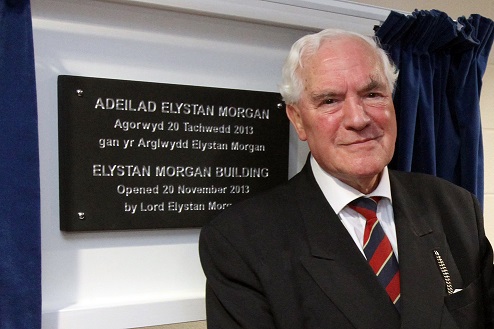Elystan Morgan (1932 - 2021)

Elystan Morgan was once one of Wales’s foremost politicians, he was a well-respected Circuit Judge, one of the country’s most forceful representatives in the House of Lords, and perhaps the most polished and cultured speechmaker of his generation. At his death Aberystwyth University has lost one of its most faithful alumni who served the institution in many ways (in his turn he was Chairman of the Old Students Association), chiefly as President of Court and Chairman of Council for the ten years between 1997 and 2007. As President he annually charmed those congregated for the degree ceremonies in the Great Hall. As Chairman his sharpness in committee could skin a fly. In both posts he was a massive support to both the Vice-Chancellors who served under him, Derec Llwyd Morgan and Noel Lloyd, and a powerful guardian of the standards and the aspirations of the University. It can be said of him that he personified Aberystwythianism.
For some years in his youth and early middle age Elystan Morgan was one of Plaid Cymru’s most famous politicians. When he joined the Labour Party in 1965 there was much gnashing of teeth and deep misgiving amongst nationalists, for many saw him as Gwynfor Evans’s natural successor. In March 1966 he was elected MP for Cardiganshire, the first Socialist to hold the seat. In 1968 Harold Wilson appointed him Under-Secretary of State for the Home Office. After the Consevatives won the 1970 general election he was successively the Opposition’s frontbench spokesman for Home Affairs and then Welsh Affairs. In 1974 the Liberals regained Cardiganshire. In 1979 Elystan Morgan stood as a candidate in Anglesey to succeed Cledwyn Hughes (another Aberystwythian, and another former President). Having failed, he never sought another parliamentary seat.
He was a student at Aberystwyth’s Department of Law. In his memoir Atgofion Oes (2012) Elystan Morgan describes it as ‘one of the most brilliant of all law schools ... in Britain in its day’, and he was proud of the fact that four members of his family were educated there. After a period as a partner in a firm of solicitors in Wrexham, in 1971 he joined Gray’s Inn as a barrister. Experience at the bar enabled him, from 1981 onwards, when he was raised to the peerage, to understudy Lord Elwyn-Jones, another of Aberystwyth’s brilliant lawyers, as spokesman on Legal Affairs in the House of Lords. In 1987 he was made a Circuit Judge, and he served until retirement in 2003.
In a way, it can be said that these posts gave him some succour, for throughout the late nineteen-sixties and early seventies he suffered more than his share of opprobrium and some hatred from people who criticised him for deserting the nationalist cause – opprobrium and hatred that nurtured in him a guarded unassumingness. When D. Ll. M. asked him to be President of the University, his initial response was, “I’m only a bit of a judge, you know, and a not very successful barrister.”
Oh, no. Had Wilson won the 1970 general election perhaps he’d have put Elystan Morgan in the Welsh Office. A few years later, when the Campaign for a Parliament for Wales needed a leader of eminent bravery and committment, who was there? Yes, Elystan Morgan. He took on the job although many of his fellow-Welsh Socialists were against any sort of home rule, and who were thus against him. Although that campaign was lost, the loss in part led to the successful referendum of 1997, a victory that heartened Elystan greatly.
His ally and comfort throughout his career was Alwen his wife whom he married in 1959 (she died in 2006), and his children Eleri and Owain and their children. He got his spiritual sustenance from his religion: he was an elder in Capel y Garn, Bow Street, since 1971. One other set of riches sustained him – literature. He was from a literary family – his father, Dewi Morgan, won the chair at the 1925 National Eisteddfod – and from boyhood he was a voracious reader of poetry, both Welsh and English, and of history, politics and theology. He could recite poems by the yard, and had such a store of remembrances and anecdotes as to be able to entertain any company. The rich mind with the silver tongue is no more.
Professor Derec Llwyd Morgan
Vice-Chancellor of Aberystwyth University 1994 – 2004
